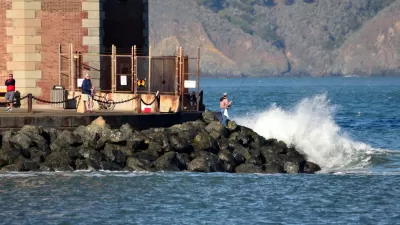Sea level rise is already flooding communities with such regularity that many residents are deciding to leave. The sea level rise tipping point will expand its reach as the climate changes.

"Coastal neighborhoods in several Bay Area cities are likely to face such frequent flooding from rising sea levels over the next century that residents will simply pack up and leave, according to a new study of the effects of climate change," reports Kurtis Alexander.
Those findings are from a report issued earlier this week by the Union of Concerned Scientists [pdf], which is "the first nationwide effort to identify the point at which coastal communities face the no-win decision of having to flee or fight sea level rise."
The report assumes a "point of no return"—when "at least 10 percent of a community experiences flooding 26 days a year, or one day every two weeks," explains Alexander. "Already, more than 90 communities across the nation have hit a point of disruption that’s driving people away […] Eighty more are expected to reach that threshold within 20 years if global warming continues at a moderate rate."
Planetizen shared resources on the issues of "managed retreat" earlier this year, and documented the experience of the Alaskan village of Shishmaref, which voted last year to relocate entirely.
FULL STORY: Scientists expect floods in Bay Area from rising seas in coming decades

Planetizen Federal Action Tracker
A weekly monitor of how Trump’s orders and actions are impacting planners and planning in America.

Congressman Proposes Bill to Rename DC Metro “Trump Train”
The Make Autorail Great Again Act would withhold federal funding to the system until the Washington Metropolitan Area Transit Authority (WMATA), rebrands as the Washington Metropolitan Authority for Greater Access (WMAGA).

The Simple Legislative Tool Transforming Vacant Downtowns
In California, Michigan and Georgia, an easy win is bringing dollars — and delight — back to city centers.

The States Losing Rural Delivery Rooms at an Alarming Pace
In some states, as few as 9% of rural hospitals still deliver babies. As a result, rising pre-term births, no adequate pre-term care and "harrowing" close calls are a growing reality.

The Small South Asian Republic Going all in on EVs
Thanks to one simple policy change less than five years ago, 65% of new cars in this Himalayan country are now electric.

DC Backpedals on Bike Lane Protection, Swaps Barriers for Paint
Citing aesthetic concerns, the city is removing the concrete barriers and flexposts that once separated Arizona Avenue cyclists from motor vehicles.
Urban Design for Planners 1: Software Tools
This six-course series explores essential urban design concepts using open source software and equips planners with the tools they need to participate fully in the urban design process.
Planning for Universal Design
Learn the tools for implementing Universal Design in planning regulations.
Smith Gee Studio
City of Charlotte
City of Camden Redevelopment Agency
City of Astoria
Transportation Research & Education Center (TREC) at Portland State University
US High Speed Rail Association
City of Camden Redevelopment Agency
Municipality of Princeton (NJ)




























